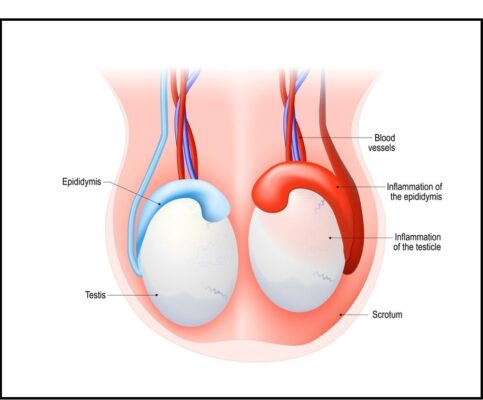Inflammation Of The Epididymis (Epididymitis)
Epididymitis is a condition that involves inflammation of the epididymis, a small organ in the male reproductive system that’s located near the testicles. It can cause pain, swelling, and other symptoms.
Causes of inflammation of the epididymis
The most common cause is a bacterial infection, such as a sexually transmitted infection (STI) like chlamydia or gonorrhea. In some cases, inflammation of the epididymis can be caused by a non-infectious condition, such as an enlarged prostate, kidney stones, or a history of urinary tract infections. Additionally, epididymitis can be caused by a physical injury to the testicles.
There are several other bacterial infections that can cause epididymitis, including:
- Coli
- Klebsiella pneumoniae
- Mycoplasma genitalium
- Ureaplasma urealyticum
These are less common causes of epididymitis than STIs like chlamydia and gonorrhea. However, it’s important to note that even if you don’t have any of the above infections, you can still develop epididymitis if you have a weakened immune system or a history of urinary tract infections.
Click here to order terminator for STI and UTI
How is epididymitis diagnosed?
When you see a doctor for symptoms of epididymitis, they’ll typically start by asking about your medical history and also carry out a physical exam. They will check for signs of infection, such as redness, swelling, and tenderness. They may also order a urine test to look for signs of infection. If they suspect epididymitis, they may also order imaging tests, such as an ultrasound or CT scan, to get a better look at the epididymis.

Most common symptoms of inflammation of the epididymis include:
– Pain in the scrotum
– Swelling in the scrotum
– Tenderness in the scrotum
– Fever
– Urinary symptoms, such as burning or painful urination
– Discharge from the penis
In some cases, men with epididymitis may also experience lower back pain, nausea, or vomiting. It’s important to seek medical attention if you have any of these symptoms, as epididymitis can lead to more serious complications if left untreated.
Treatment for epididymitis
The treatment for the inflammation of the epididymis will depend on the underlying cause. For bacterial infections, antibiotics are usually prescribed. The specific antibiotic that’s prescribed will depend on the type of bacteria that’s causing the infection. For non-infectious causes of epididymitis, treatment may involve rest, pain relievers, and applying ice packs to the scrotum. In some cases, surgery may be necessary to treat epididymitis.
Health complications
Some of the possible complications of epididymitis include:
- Infertility
- Testicle damage, including tissue death (necrosis)
- Recurrent episodes of epididymitis
- An abscess (collection of pus) in the epididymis
- Testicular torsion, or twisting of the testicle
It’s important to note that not everyone with epididymitis will experience complications. However, if you have any concerns, be sure to speak with your doctor.
What is the relationship between epididymitis and orchitis?
Orchitis is inflammation of the testicle, while epididymitis is inflammation of the epididymis, which is a small tube that’s located behind the testicle. It’s possible to have orchitis and epididymitis at the same time, as they can occur together. However, they can also occur separately. Orchitis is typically caused by a viral infection, such as mumps, while epididymitis is typically caused by a bacterial infection.
How can epididymitis be prevented?
The best way to prevent epididymitis is to practice good hygiene and safe sex. You should also avoid sharing towels, clothing, or bedding with others, as this can spread bacteria that can cause infection. Additionally, you should avoid wearing tight clothing or underwear that can cause irritation and swelling.
Can UTI cause epididymitis?
Yes, it’s possible for epididymitis to be caused by a urinary tract infection (UTI). This is called ascending epididymitis, and it occurs when bacteria travels from the bladder up the urethra to the epididymis. Typically, this happens when a person has an untreated UTI or doesn’t fully recover from a previous UTI. UTIs are usually caused by bacteria, such as Escherichia coli (E. coli).
Your Wellness Is Our Concern At Fekomi Wellness
Are you suffering from sexual dysfunctions such as erectile dysfunction, premature (delayed) ejaculation, and low libido? Fekomiherbals has the ultimate solution.
Also, our team of highly qualified and certified healthcare consultants at Fekomi wellness are always ready and happy to help you with your health concerns. Visit Fekomi wellness today to book an appointment and get started on your health journey. Kindly call our desk line on +2349074197154 for more enquiries.
